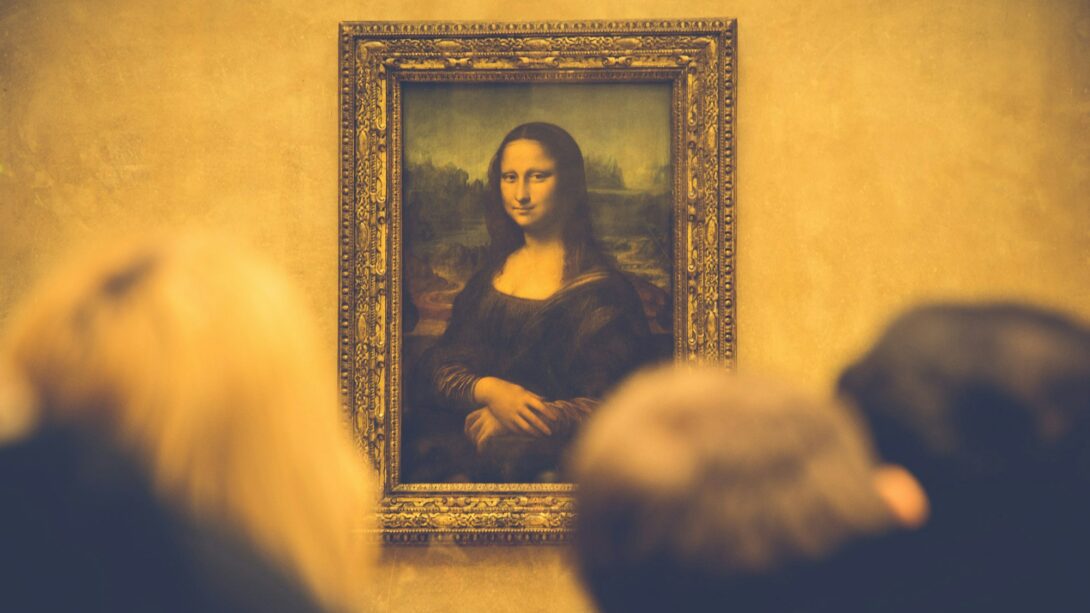About 22 years ago, I took a trip to France. While there, I visited the famed Louvre Museum in Paris, the home of Leonardo da Vinci’s Mona Lisa. I stood before this small but renowned painting housed in bulletproof glass gazing at its mystery, intrigue, innovation, and beauty. It’s not my favorite painting, but it’s remarkable, nonetheless. It’s remarkable because da Vinci was remarkable.
Though we haven’t met him, we do know something about da Vinci by seeing his artwork. The Mona Lisa is an oil painting on poplar wood. Da Vinci made the individual parts into a masterpiece. He used a painting technique called sfumato [soo-MA-toe] which conceals transitions between colors and softens the image. The brushstrokes are undetectable to the naked eye. Da Vinci used masterfully thin layers of paint to create the mysterious glow effect. The painting is a display of an almost otherworldly talent. If we were allowed to look closely at the Mona Lisa, we might find ourselves asking, “How’d he do that?”
Perhaps something inside you resonates with the atheists who say, “I’d believe in God if He simply gave me some evidence for His existence.” There’s something uncomfortable, albeit glorious, about worshipping an invisible incorporeal spirit. It’s unlike any other relationship we have. How does a person begin to fellowship with an incorporeal spirit he or she can’t see? You may struggle with this. Your prayers may feel slightly foolish considering you can’t see the God to whom you’re speaking.
But God is revealing Himself every day in the things He has made, and if you are intentional in how you experience the world, you’ll notice His extraordinary achievements. Like the attributes of the Mona Lisa boast of and authenticate the outstanding but invisible ability of da Vinci, the universe boasts of the invisible attributes of God’s eternal power and divine nature, as Paul expressed in Romans 1:20. The universe is artwork. The universe invites you and me to look closely, to study the intricate details, and to marvel at the creativity and ability of the divine Artist. The wonder and meaning of God’s art are destroyed for the person who ignores God; the art becomes absurd. God is daily inviting you and me through His artwork to marvel at the wonder of His essence, His being, His character, and His aptitude. Psalm 102:25 says, “Of old you laid the foundation of the earth, and the heavens are the work of your hands.” Psalm 92:4 says, “at the works of your hands I sing for joy.”
Similarly, when we see the controlled acrobatics of the kite in the wind, and the strings disappear behind the trees, we assume an experienced pilot is holding the strings. We may go running to see who the pilot is and to watch him fly the kite. In the case of the universe, the strings lead back to the hands of God and His providence.
When the adorable smile of your child warms your heart; when the butterfly alights on the flower; when the ocean waves sooth your spirit; when you taste the delicious spicy chicken and follow it with a swig of southern sweet tea; when the snowcapped mountains stir your spirit to awe; as you jump from poolside into the water to cool off from the summer heat; when you enjoy love and sexual intimacy with your spouse; your senses are experiencing gifts from God to you, gifts that tell you about His existence, His ability, His power, His beauty, His creativity, and His goodness. To enjoy the living and working art of the universe without also delighting in the goodness of the Artist is empty, aimless, and sad. There is significance, opportunity, and fulfillment in every daily experience of creation, and only a fool would say the Mona Lisa painted itself.
And yet, the Mona Lisa only tells us a bit about Leonardo da Vinci. We know more about him when we read his notebooks. One website reported about da Vinci: “His notebooks contain diagrams, drawings, personal notes and observations, providing a unique insight into how he saw the world.” [1] The content of his personal notes tell you even more about him. For example, he wrote from right to left. Was he left-handed? The notebooks make the Mona Lisa more personal.
Not only does God reveal Himself to you in creation, He gives you His heart in holy Scripture. The combination of creation and Scripture provide us the supernatural means through which we know the one true God.
Article Two of the Belgic Confession is titled, “How God Makes Himself Known to Us.” How God reveals Himself to us should be of utmost interest to you and me. The more we grasp this, the more profoundly we will experience and enjoy creation and Scripture to God’s glory. Article Two states:
We know him by two means: First, by the creation, preservation, and government of the universe; which is before our eyes as a most beautiful book, wherein all creatures, great and small, are as so many letters leading us to perceive clearly God’s invisible attributes, namely, his eternal power and divine nature, as the apostle Paul says in Romans 1:20. [1]
Think about that. The universe is a beautiful book. We read by observing. Humans, ants, and whales; oak trees, roses, and rocks; stars, moons, and planets are all letters in this beautiful book. These divinely written letters communicate the eternal power and divine nature of God Himself. Psalm 19:1 states, “The heavens declare the glory of God, and the sky above proclaims his handiwork.” Every experience of your daily routine is an opportunity to read about God’s glory and goodness.
Article Two echoes Paul by saying, “All these things are sufficient to convict men and leave them without excuse.” God has given sufficient evidence to everyone. Atheism is born not out of the lack of evidence but out of a stubborn closing of the eyes, the eyes of the soul.
Article Two continues: “Second, he makes himself more clearly and fully known to us by his holy and divine Word as far as is necessary for us in this life, to his glory and our salvation.” Scripture is an actual divine book through which God reveals Himself much more clearly, more fully, more personally through actual letters. Like da Vinci’s notebooks take us closer to his personality, Scripture takes us into the tri-personality of God with detail and specificity. God’s self-revelation in creation is sufficient knowledge to leave none of us with any excuse, yet it does not reveal to us the tri-personality of God and His wondrous works of redemption. We need the book of Scripture to know personally, to know Him as Savior, Redeemer, and Friend.
Every day God reveals Himself to you in creation. Don’t miss Him. Observe his power and nature, enjoy what He has made, and praise Him as the “overflowing fountain of all good.” [3] Delight in your sensory experiences for His glory and honor. Tell Him how good He is as you experience the delights around you.
Additionally, every Sunday you hear the Word read and faithfully exposited at your church, you’re receiving God’s gracious self-revelation. He is speaking to you in and through law and gospel-permeated corporate worship. Even as you read and ponder a Bible verse or more throughout your day, God is lovingly revealing Himself to you. Receive Scripture as God’s personal self-revelation. Delight in what He tells you about Himself.
Of course, all that I’m saying requires true faith (HC 21). Apart from faith we simply will not see, will not hear, and will not understand. We will be thoroughly underwhelmed, uninformed, and unaware apart from true faith in God’s Word. The Holy Spirit working faith in our hearts by the gospel is the only way we will experience the glorious self-revelation of God every day (HC 21).
This is the joy of being Reformed. Reformed Theology helps us experience God’s self-revelation in creation and Scripture for God’s glory and our happiness and thankfulness. Be encouraged, God does not allow you to go through even a single day without some blessing or experience that communicates to you His goodness.
[1] https://www.vam.ac.uk/articles/leonardo-da-vincis-notebooks
[2] https://canrc.org/the-belgic-confession#article-1
[3] Belgic Confession Article One.
Scripture quotations are from the ESV® Bible (The Holy Bible, English Standard Version®), copyright © 2001 by Crossway, a publishing ministry of Good News Publishers. Used by permission. All rights reserved. May not copy or download more than 500 consecutive verses of the ESV Bible or more than one-half of any book of the ESV Bible.


